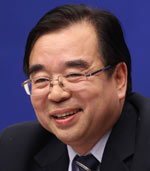Treatment for hyperthyroidism gets harder to find as profits shrink
The top health authority vowed to introduce a solution to the shortage of drugs for patients who suffer from hyperthyroidism in China.
 |
|
Mao Qun'an, spokesman for the National Health and Family Planning Commission |
China currently has about 10 million sufferers of an overactive thyroid, according to a recent epidemiology study by the Chinese Medical Association. Without treatment, the condition can lead to serious heart and bone problems.
"Cheap and effective drugs such as Tapazole have been disappearing from the market. We are working on a new mechanism to balance the economic interests of pharmaceuticals and the public demand for affordable and effective drugs," said Mao Qun'an, spokesman for the National Health and Family Planning Commission, at a news conference on Tuesday.
China initiated healthcare reform in 2009 to improve public access to affordable, quality medical care and introduce a list of essential drugs for the country, Mao said.
While pricing for listed drugs including Tapazole is strictly controlled under the system, it has led to one major side effect: narrow profit margins for drug producers, who then give up producing certain drugs, said Ma Jin, a professor at the public health department of Shanghai Jiao Tong University.
With many of the 13 pharmaceuticals registered to produce Tapazole in China halting production on the drug, a shortage ensued.
Huang Wenfang, a retiree in Shenyang, Liaoning province, said that since last January she hasn't been able to buy domestically made Tapazole in the city.
First diagnosed as a hyperthyroid patient eight years ago, Huang, 64, has been on treatment since then. But the price for a bottle of 100 tablets has increased from 1.7 yuan (28 US cents) to 2.5 yuan, she said. Imported versions cost more than 10 times that.
"I was so upset when I discovered that hospitals and drugstores were all out of the medication. Without it, I can't remain healthy," she said.
Before her treatment, she used to suffer from serious weight loss, anxiety, intolerance to heat, hair loss, muscle aches, weakness and severe fatigue.
"I used to weigh less than 40 kilograms," said Huang, who now weighs about 60 kg.
In recent months, patients from far-flung regions such as Wuxi, Jiangsu province, and Ankang, Shaanxi province, have begun to report shortages of imported Tapazole, according to media reports. Major hospitals in big cities, however, are not reporting any problems with supplies of imported Tapazole.
Xing Xiaoyan, a longtime doctor of endocrinopathy at the Sino-Japan Friendship Hospital in Beijing, said the hospital has never run out of Tapazole, though she admitted that it mainly provides the imported kind.
Mao said the 2009 medical reform may have created supply and demand problems, but that the health authority is working on a long-term solution.
"Under a market economy, all stakeholders need to cooperate and negotiate a balance to prevent similar problems from happening again in a bid to secure the drug supply," he said.
